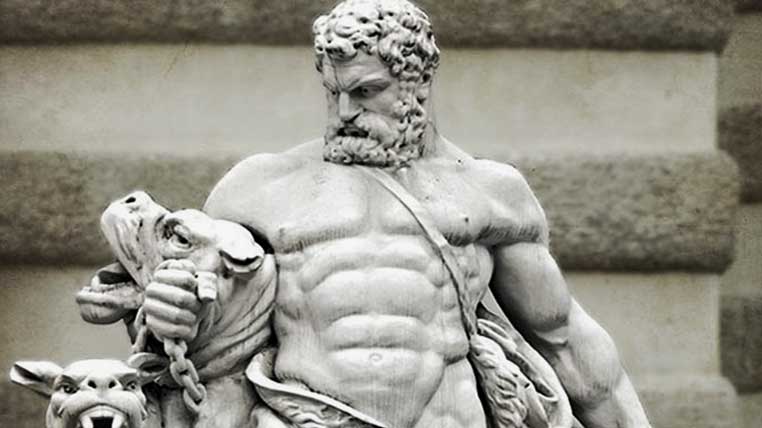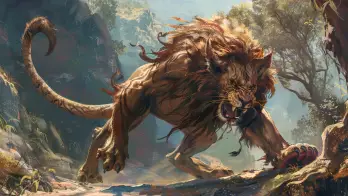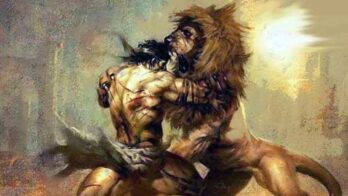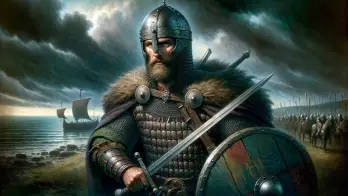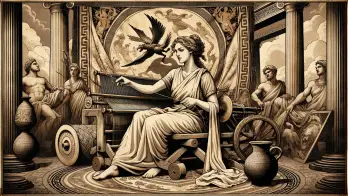Typically depicted wearing a lion’s skin and wielding a massive club, Heracles was born to Zeus and Alcmene, a mortal woman. The hero possessed a gigantic, muscular physique, befitting his divine parentage.
Despite his divine origins, Heracles faced numerous challenges from birth due to Hera’s hatred for him, stemming from her husband Zeus’s infidelity with a mortal woman. As a result, the hero was subjected to a life filled with struggles and conflicts.
Heracles’ most notable heroic feat was the completion of the Twelve Labors, a series of tests he was required to fulfill for his cousin Euristeus, a great Mycenaean king.
By completing these trials and other remarkable feats, Heracles established himself as a champion of the common people and a monster slayer.
In addition to his heroic deeds, the hero was known for his fiery temperament, violent and brutal tendencies, and amorous escapades, from which an uncountable number of children were born.
Etymology
Etymologically, Heracles was initially known as Alcide, named after his grandfather. However, his name was later changed to “Heracles,” derived from the goddess Hera and the Greek word kleros, meaning “glory,” translating to “Hera’s glory.”
This name change honored the goddess Hera, one of his greatest adversaries.
Characterization
Heracles, also known as Hercules in Roman mythology, possessed extraordinary strength, courage, ingenuity, and sexual prowess with both males and females.
He was revered for his physical abilities, which included wrestling giants like Antaeus, tricking Atlas into taking the sky back onto his shoulders, and laboring for the king Augeas of Elis, using his wits to overcome situations when his strength alone was insufficient.
Heracles was also a patron and protector of gymnasia and palaestrae, along with the god Hermes.
He is often depicted in iconography wearing a lion skin and wielding a club. Despite his reputation for ferocity and strength, Heracles was also seen as a playful figure who enjoyed playing games to relax from his labors and spent time with children.
By conquering dangerous and archaic forces, Heracles is said to have “made the world safe for mankind” and been its benefactor.
He was emotional, passionate about his friends, and capable of doing great deeds for them, such as wrestling with Thanatos on behalf of Prince Admetus and restoring his friend Tyndareus to the throne of Sparta after he was overthrown.
However, he was also known for being a terrible enemy, wreaking horrible vengeance on those who crossed him, as Augeas, Neleus, and Laomedon all found out to their cost.
Heracles was a complex figure with a multifaceted personality.
In Euripides’ works, his actions were sometimes driven by forces beyond rational human control, highlighting the divine causation of his madness.
This aspect of his character and status within the civilized context was further problematized by Sophocles’ depiction of the hero in The Trachiniae, which revealed a coldness to his character.
According to Seneca’s Hercules Furens, Heracles’ madness was linked to his refusal to live a simple life, as offered by Amphitryon, and his preference for the extravagant violence of the heroic life.
The ghosts of this lifestyle eventually manifested in his madness, leading to hallucinatory visions that further defined his character.
Even Heracles’ desire to bring two women under the same roof, including his wife, Deianeira, threatened his marriage, revealing a complex and flawed character beneath his heroic exterior.
Genealogy
Heracles, also known as Hercules, was born to Zeus, the king of the Greek gods, and a mortal woman named Alcmene.
Alcmene was the daughter of Electryon, the king of Mycenae, and the son of the hero Perseus.
Heracles grew up in Thebes alongside his stepbrother Iphicles (not to be confused with Iphiclus, the son of Phylacus, who was mainly known for his miraculous healing of impotence by the healer Melampus).
Later, Iphicles’ son, Iolaus, would accompany Heracles on some of his adventures.
Parents
- Zeus – In Greek mythology, Zeus was the king of the gods and the god of thunder and lightning. He was often depicted as a mature, bearded man holding a thunderbolt.
- Alcmene – She was the daughter of Electryon, the king of Mycenae, and the wife of Amphitryon, a Theban general. Alcmene was known for her beauty and wisdom, and she played an essential role in Heracles’ life, supporting him in his heroic deeds and helping him through difficult times.
Siblings
- Apollo – the god of music, poetry, prophecy, and healing. He was often depicted as a young man with a lyre, a bow, or a laurel wreath.
- Ares – the god of war and violence, frequently portrayed as a muscular man with a helmet, a spear, or a shield.
- Dionysus – the god of wine, fertility, and ecstasy. In Greek mythology, Dionysus was oftentimes depicted as a youthful, beardless man with a wreath of ivy or grapes.
- Hephaestus – the god of fire, metalworking, and craftsmen. He was described as a bearded man with a hammer, tongs, or an anvil.
- Hermes – the god of commerce, thieves, and travelers, depicted as a young man wearing a wide-brimmed hat or a winged helmet, with a caduceus or a purse.
- Iphicles – the mortal half-brother of Heracles, born to Amphitryon and his first wife.
- Minos – a king of Crete known for his wisdom and justice. In Greek mythology, Minos was also the judge of the dead in the afterlife.
- Perseus – a hero known for slaying the Gorgon Medusa and rescuing Andromeda from a sea monster. He was also the founder of the city of Mycenae.
- Rhadamanthus – a judge of the dead in the afterlife, known for his impartiality and fairness.
- Aphrodite – the goddess of love, beauty, and fertility. She was portrayed as a voluptuous woman with a girdle or a dove.
- Athena – the goddess of wisdom, warfare, and crafts, oftentimes represented as a mature woman wearing a helmet or aegis, with an owl or a spear.
- Artemis – the goddess of the hunt, wild animals, and childbirth. In Greek mythology, Artemis was depicted as a young woman with a bow, arrows, or a deer.
- Eileithyia – the goddess of childbirth and midwifery. She was often depicted as a woman holding a torch or a child.
- Hebe – the goddess of youth and the cupbearer of the gods. She was often depicted as a young woman pouring nectar or ambrosia.
- Helen of Troy – a mortal woman known for her beauty. She was kidnapped by Paris and caused the Trojan War.
- Persephone – the goddess of the underworld and the wife of Hades. She was often depicted as a young woman holding a torch or a pomegranate.
- The Graces – goddesses of beauty, charm, and grace. They were often depicted as three young women holding hands or dancing.
- The Fates – three goddesses who controlled the destiny of mortals. Clotho spun the thread of life, Lachesis measured its length, and Atropos cut it with her shears.
- The Muses – nine goddesses who presided over the arts and sciences.
Notable wives and lovers
- Megara – She was the first wife of Heracles, and they had children together. According to the myth, Hera drove Heracles insane, which caused him to kill Megara and their children.
- Omphale – She was a queen who purchased Heracles as a slave, and they fell in love. Omphale dressed Heracles in women’s clothing and forced him to do women’s work while she wore his lion’s skin and carried his club.
- Deianira – She was the wife of Heracles, whom he married after the death of Megara. Deianira accidentally caused the death of Heracles by giving him a poisoned shirt that she thought would restore his love for her.
- Hebe – She was the daughter of Zeus and Hera and the goddess of youth. Heracles married her after he was deified.
- Astydameia, daughter of Ormenus – She was the wife of Heracles, and they had several children together.
- Astyoche, daughter of Phileas – Another wife with which Heracles had several children.
- Auge – She was the mother of Heracles’ son, Telephus, whom he had with her before he married Megara.
- Baletia, daughter of Boletus – Another lover of Heracles. She gave birth to Tlepolemus.
- Epicaste – The mother of the Theban princes. The myth says that Heracles killed them in a fit of madness.
- Lavinia, daughter of Evander – She was a princess whom Heracles abducted and brought to Italy, where she became the mother of his son, Pallas.
Other lovers
- Bolbe
- Malis
- Autonoe, daughter of Piraeus
- Barge
- Iphinoe
- Meda
- Melite
- Myrto
- Palantho of Hyperborea
- Parthenope, daughter of Stymphalus
- Philo
- Psophis
- Pyrene
- Rhea, a Roman princess
- Thebe, daughter of Adramys
- Tinge, wife of Antaeus
- The 50 daughters of Thespius
Notable children
- Thrasymachus – one of the Argonauts and was known for his wisdom.
- Creontiades – a son of Heracles and Megara killed by Hippotes in battle.
- Ophitus – the son of Heracles and Eurytus’ daughter. He was killed by his own father along with his siblings after Eurytus accused Heracles of cheating in an archery contest.
- Agelaius – the king of the island of Cos and had a son named Euryalus.
- Tyrsenus – the founder of the city of Tyrsenoi in Italy.
- Hyllus – the leader of the Heraclids, the descendants of Heracles, who invaded the Peloponnese.
- Glenus – the founder of the city of Glenos in Achaia.
- Oneiti – the son of Heracles and either Automedusa or Lysidice. He was the father of Thettalus, who was also known as Heracleidae.
- Macaria – she was offered as a sacrifice to the gods in exchange for victory in battle, but she willingly gave her life to save her father and his army.
- Alexiares and Anicetus – sons of Heracles and Hebe. They were worshipped as gods and guardians of Olympus’s gates.
- Tlepolemus – he led the Rhodian contingent in the Trojan War.
- Telephus – e was the king of Mysia and was wounded by Achilles during the Trojan War.
- Palaemon – he was a sea god who protected sailors and fishermen.
- Brettus and Bargasus – leaders of the Celts who invaded Greece.
- Olynthus – the founder of the city of Olynthus in Chalcidice.
- Thessalus – a son of Heracles and Chalciope. He was Antiope’s father, the mother of Amphion and Zethus.
- Gelon, Agathyrsus, and Gelonus – three sons of Heracles and Echidna. They were monsters with serpents’ bodies and various animals’ heads.
- Palas and Acelus – founders of the cities of Pallantium and Aclea in Arcadia.
- Eucleia – a daughter of Heracles and Thera. She was the goddess of good repute.
Other children
- Deicoon
- Thestralus
- Antiochus
- Celtus
- Ctesippus
- Latinus
- Echmagora
- Echephron
- Promachus
- Aventis
- Sophax
- Galates
- Alcaeus
- Cleodaeus
- Diodorus
- Agylleus
- Amathus
- Azon
- Chromis
- Cygnus
- Dexamenus
- Leucite
- Manto
- Pandais
- Phaestus
- 50 unnamed sons (with the 50 daughters of Thespius)
Myths and Legends
Greek mythology has many myths and legends about Heracles (Hercules). He was one of the most famous heroes in ancient Greek literature, and his adventures were the subject of many stories, poems, and plays.
He was known for his incredible strength and ability to accomplish seemingly impossible tasks, such as slaying the Nemean Lion, capturing the Golden Hind, and cleaning the Augean Stables in a single day.
Heracles was also known for his involvement in the Argonauts’ quest for the Golden Fleece and for his Twelve Labors, a series of challenges he had to complete to atone for killing his wife and children in a fit of madness induced by the goddess Hera.
Zeus Deceives Alcmena
According to ancient legends, Zeus, the ruler of Olympus, decided to father an exceptional son who would be an unparalleled hero and his support and help when needed.
Zeus then turned his attention to the vast land, where countless enchanting women lived, and among all of them, he was captivated by a girl of rare beauty named Alcmena.
The poets of that time sang about Alcmena’s beauty.
Her sublime grace and spell emerged from her abundant hair and shadowed eyelids, much like the goddess Aphrodite, the most beautiful of the immortals. Gods and ordinary people alike were captivated by Alcmena’s beauty.
However, Alcmena had a burning love for her husband, king Amfitrion, whom she was married to and lived with in Thebes.
However, Zeus ignored this and waited until Amfitrion had left for battle.
Immediately, the ruler of Olympus changed his appearance to look like Alcmena’s husband and descended into Thebes. He then made a gesture with his hand, and a large army followed him.
Thus, Zeus entered the palace in the sounds of drums, pretending to be Amfitrion himself and that he had returned from war earlier.
Unsuspecting and delighted by her beloved husband’s return, Alcmena welcomed him with all her love. Throwing his helmet, armor, and shield on the ground, Zeus embraced the faithful wife of Amfitrion.
Hera’s Terrible Curse
As Alcmena was about to give birth, Zeus, the king of the gods, summoned all the deities of Mount Olympus to boast about the birth of his soon-to-be son.
He proclaimed that his son would be an unparalleled hero who would rule over Argolida, particularly in the city of Mycenae, with all others serving him. This was the decision of the god of gods himself, and it would remain so.
However, Hera, Zeus’s wife, had already discovered her husband’s deception and harbored intense hatred and jealousy toward him.
She demanded that Zeus swear on the river Styx that the child born that day from Perseus’s loin would indeed be king in Mycenae, and all others would serve him. Zeus, unaware of anything, made the oath as Hera demanded.
Yet, Hera had already devised a plan.
She quickly flew to Mycenae, where King Sthenelos, another son of Perseus, ruled. Sthenelos’s wife was due to give birth in two months, but Hera cast a spell to make her give birth early. Meanwhile, she delayed Alcmena’s delivery using magic only known to her.
Hera returned to Olympus and taunted Zeus, revealing that the son who would be king in Mycenae had already been born and was named Eurystheus:
Oh, Zeus, you swore that the son who will be born today of the Perseus line will be king in Mycenae. But know this, master of Olympus: he has already been born and his name is Eurystheus.
Zeus was enraged and threw thunderbolts into the world, burning villages, cities, and towns. But his oath could not be broken. As a result, the son of Sthenelos became king, and his son became a slave.
Finally, freed from Hera’s spell, Alcmena gave birth in great pain to twin boys in the palace of Amphitryon in Thebes. The first child, Alcides, was fathered by Zeus, and the second child, Iphicles, was the son of Amphitryon.
Alcides’ Triumph Over Hera’s Serpents
Despite being the son of Zeus and Alcmene, Alcides’ life was not devoid of dangers. In fact, his existence enraged Hera, who saw him as a threat to her power.
Driven by hatred and jealousy, Hera hatched a sinister plan to eliminate the young boy.
In a dense forest, two colossal serpents lived, each as long and thick as a dragon. With their powerful coils, the serpents had captured a roe deer and were injecting it with their venomous fangs.
Upon Hera’s command, the reptiles slithered towards Thebes, where the two brothers, Alcides and Iphicles, slept on a bronze shield.
Under the cloak of midnight, the serpents crawled through the city’s dark alleys and corners until they reached the room where the brothers slept. They approached the sleeping children with glowing eyes and venomous tongues, ready to strike.
Suddenly, Alcides woke up to a bright light that filled the room, blinding Iphicles, who also jumped out of bed.
The brothers saw the serpents near the shield, and Iphicles screamed in terror and ran away. However, Alcides remained calm and focused, kneeling down to confront the monsters.
He grasped the serpents with his strong hands, squeezing them with a vice-like grip. The snakes wriggled and coiled, trying to escape the boy’s grasp and strangle him, but Alcides’ grip was too strong.
He crushed the serpents with unyielding strength until they breathed their last breaths.
Alcmene and Amphitryon, awakened by the commotion, rushed to their sons’ room, shouting in fear and amazement: Alcides proudly presented the lifeless bodies of the serpents to his parents, overcoming the challenges posed by Hera’s cruel machinations.
A New Curse Falls Upon Alcides
Alcides, the son of Zeus and the beautiful Alcmena, had grown into a handsome, strong, agile, righteous, and gifted young man by the age of 18.
Despite being a king’s son, he preferred a simple life, shunning fancy clothes and indulging in fruits, vegetables, and roasted meat while seldom drinking wine.
He was also known for his unmatched bravery and courage, having once single-handedly faced and defeated a large army that had invaded Thebes, looted its gold, and taken thousands of slaves.
As a gesture of gratitude, Creon, the King of Thebes, offered Alcides his daughter Megara’s hand in marriage.
Megara was renowned for her exceptional beauty, and the king was confident that Alcides would be a great son-in-law and heir, who would rule the city well and keep the people content even after his death.
Alcides accepted the proposal, and Megara bore him three children he adored and spent quality time with.
However, Hera, the goddess of marriage and childbirth, who held a grudge against Alcides as he was the son of her rival, became envious of his happy family life.
She summoned Mania, the goddess of madness, who possessed a golden cup filled with poison, and ordered her to descend to Earth and steal Alcides’ mind, even if only for a few moments.
Mania carried out Hera’s orders and spread the poison on Alcides, causing him to hallucinate that his wife and children were cyclops and that they posed a grave danger to his family.
Driven mad, he grabbed a club and killed them all in a single blow. Upon realizing what he had done, Alcides fell to the ground, his soul crushed.
The Oracle of Delphi and the Path of Virtue
According to legend, Alcides awoke alone and full of despair after Hera’s cruel revenge.
He contemplated jumping off a high cliff until Athena, the goddess of wisdom, appeared and spoke:
Do not hasten, Alcides. What transpired was not your fault. Hera’s vengeful act was in response to your happiness, and she arranged for you to inadvertently harm your children and to atone for a crime that is not yours.
While it is unjust, the other gods of Olympus will side with Hera because they fear her wrath. Even Zeus, your father, is usually silent and does not oppose her, as Hera is cunning and can even harm her husband.
However, I will aid you as I detest Hera’s arrogance. And perhaps Hermes, the messenger of Zeus, will assist you too.
Depart from Thebes with its seven gates and go to Delphi to purify your body as decreed by Zeus’ law. The mighty Apollo will reveal to you what is required.
At the temple of Delphi, Alcides meets Apollo, who informs him of the horrific sentence he must endure at Hera’s behest. The son of Zeus must serve as a slave to the King of Mycenae and atone for his crimes.
At the same time, Apollo gives the hero the name Heracles, confident that he will overcome all the dangers that Hera puts in his path.
After meeting with Apollo, Alcmene’s son departs for Mycenae. As he walks, he encounters two strange women at a crossroads.
One is adorned in all kinds of finery, with violet eyes, dressed in gaudy clothing. She wears bangles, rings, and precious adornments and has pink silk veils woven into her hair. The woman giggles and casts bold glances, and smiles at passersby.
The other woman is dignified, dressed in a cloak-like mist. She has a straight forehead, resembling Athena, and surveys him directly with a serene gaze. In her hand, she carries a wreath of laurel.
Seeing the hero walking dejected and thoughtful, both women ask where he is going. Raising his gaze from the ground, the son of Zeus answers them, “I’m looking for the straighter path.”
The first woman, dressed in fine clothes, attempts to beguile him with her words and seductive movements:
I can guide you on a path without hardship. Follow me. I bring joy, although many call me Debauchery. By following me, you can relax, acquire wealth from the labor of others, and your only concern will be how to revel and enjoy life. Come, follow me!
But the second woman steps forward and speaks:
Wait, do not go, brave one. While the Road of Debauchery offers many pleasures, those who indulge in them become slaves, despised by all, and their old age is sad and shameful.
My path is more challenging, filled with battles, toil, and dangers, but victory awaits at its end. I am Virtue. I accompany the brave who fight for people, honor, and justice. I aid them in overcoming all evils, triumphantly bringing good to the earth.
Upon hearing Virtue’s words, Heracles rejects Debauchery’s grasp and refuses to follow the path of easy pleasures:
Although powerful, Hera has cursed me to be the slave of a cowardly king from Mycenae. I do not fear my fate and would not have submitted it. Still, I desire to atone for my terrible crime, committed unintentionally, by fearlessly fighting and transforming all the evil concocted there into glory and good for people. Vile Debauchery, you can’t deceive me! I will fight Hera, and when I conquer her, I will be happy. I choose the path of Virtue.
Since those moments – as the poets sang – without hesitation, Heracles followed only the arduous road, shown by Virtue, no matter how many obstacles, fights, and terrible dangers were laid in his way by the ruthless Hera, King Eurystheus, other kings, monsters, and beasts, thousands of enemies.
The Twelve Labors of Heracles
The legend of Heracles is a captivating tale, with countless Greek myths and legends recounting his incredible feats.
However, none are more renowned than the trials that came to be known as “The Twelve Labors of Heracles.” These tests were imposed on the son of Zeus and Alcmene by Eurystheus, the king of Mycenae.
According to Greek mythology, these labors were designed to be extremely difficult and deadly, with the intention of destroying Heracles once and for all.
Despite her efforts, however, the son of Zeus proved indomitable, completing each of the twelve labors and thus securing his immortal fame and glory.
The Greek writer and philosopher Apollodorus enumerate the twelve labors in the following order:
- Killing the Nemean Lion
- Killing the Hydra of Lerna
- Capturing the Golden Hind of Artemis
- Capturing the Erymanthian Boar
- Cleaning the Augean Stables
- Slaying the Stymphalian Birds
- Capturing the Cretan Bull
- Stealing the Mares of Diomedes
- Obtaining the Girdle of Hippolyta
- Getting the Cows of Geryon
- Stealing the Apples of the Hesperides
- Capturing Cerberus, the three-headed dog of Hades
The Nemean Lion
Apollo commanded Heracles to rid the hills of Nemea of a ferocious lion that had been terrorizing the region. He found the lion in its cave and strangled it. He then wore the lion’s pelt as a cloak for the rest of his life.
The Lernaean Hydra
In his second task, Heracles journeyed to Lerna to slay the nine-headed Hydra, a poisonous, snake-like creature guarding the entrance to the Underworld. With the help of his nephew Iolaus, Heracles cut off each head, while Iolaus burned the wound to prevent them from growing back.
The Golden Hind
Heracles’ next mission was to capture the sacred pet of the goddess Diana: a red deer, or hind, with golden antlers and bronze hooves. He explained his situation to Diana, who allowed him to go without punishment.
The Erymanthean Boar
In his fourth labor, Heracles used a giant net to trap the terrifying, man-eating wild boar of Mount Erymanthus.
The Augean Stables
Heracles’ fifth task was to clean all the manure out of King Augeas’ enormous stables in a single day, which was thought impossible. However, the hero flooded the barn by diverting two nearby rivers, and completed the job easily.
The Stymphlaian Birds
In his sixth task, Heracles traveled to Stymphalos to drive away a flock of carnivorous birds that had taken up residence in its trees. With the help of Athena, who gave him a pair of magical bronze noisemakers forged by Hephaistos, he managed to frighten the birds away.
The Cretan Bull
Next, Heracles captured a rampaging bull in Crete that had impregnated the wife of the island’s king, who later gave birth to the Minotaur. He brought the bull back to Eurystheus, who released it into the streets of Marathon.
The Horses of Diomedes
For his eighth challenge, Heracles had to capture the four man-eating horses of the Thracian king Diomedes. He brought them to Eurystheus, who dedicated the horses to Hera and set them free.
Hippolyte’s Belt
Heracles’ ninth task was to steal an armored belt that belonged to the Amazon queen Hippolyte. Hera, disguised as an Amazon warrior, spread a rumor that the hero intended to kidnap the queen, leading to a fight. Fearing for his safety, the son of Zeus killed Hippolyte and took the belt.
The Cattle of Geryon
Heracles was sent to steal the cattle of the three-headed, six-legged monster Geryon for his tenth task, nearly to Africa. With Hera doing all she could to stop him, he succeeded and brought the cows back to Mycenae.
The Apples of Hesperides
Eurystheus sent Heracles to steal a set of golden apples, a wedding gift from Hera to Zeus, guarded by nymphs called the Hesperides. With the help of Prometheus and Atlas, he obtained the apples and returned them to the gods’ garden.
The Death of Heracles
The Death of Heracles is a legendary tale about the hero’s exploits and eventual downfall.
After successfully completing all the tasks that Eurystheus had commanded, Heracles embarked on a journey to confront monsters, beasts, and cruel kings.
He aided Zeus in defeating the giants and punished King Laomedon of Troy, who had deceived him. Additionally, he engaged in combat with Ares and his sons, defeating them in a fair fight.
He also fought with Apollo and overcame Achelous, a son of Ocean, who had attempted to abduct Deianeira, the proud and beautiful maiden whom Heracles took as his wife after defeating Achelous.
Heracles and Deianeira lived happily for a while until the vengeful Hera turned her gaze upon him again.
Enraged by seeing him standing with his good friend, Ifitos, on the high walls of Tiryns, the goddess sent a fury, a dark spirit from the realm of Hades, to cloud his mind.
Heracles, bewitched by wrath, felt a burning sensation in his chest, his eyes turned red like those of a rabid dog, and his arm, pushed by Hera, struck Ifitos with such force that he fell from the high walls and died.
As per the old laws, Heracles became a slave once again. This time, he was bought by Omfala, a capricious, wealthy, and haughty queen who ruled over Lydia.
For three years, she subjected him to all kinds of humiliations.
Omfala forced the valiant man to dress in veils like a housemaid, weave delicate fabrics for war on her behalf, and spin wool on the spindle with his hand, which was previously used only to fight brutal battles.
In return, she played with his legendary bow and arrows that had destroyed so many monsters and dragons in battle, took the skin of the Nemean lion that Heracles had defeated, and picked up his shield and armor.
Despite being enslaved and humiliated, Heracles looked upon the young queen with gentleness, forgetting his manliness.
However, even there, Hera did not leave him in peace. She sent Eros to shoot his chest, disturbing his senses and causing him to have an undignified love for the queen of Lydia.
Heracles finally managed to escape from slavery and set off for home to his beloved Deianeira.
However, Deianeira’s mind had already been twisted by jealousy after the rumors of the hero’s love for the queen of Lydia reached her ears.
When she heard that her husband was almost home, Deianeira took a beautiful garment sewn only in gold and silver thread, to which she had added a few drops of the blood that the centaur Nessus had offered her as a gift, with a dying tongue.
Unfortunately, Deianeira did not know that the centaur had deceived her at Hera’s behest. The enchanted blood was not meant to make Zeus’ son love her again; instead, it was a potent poison meant to bring about the end of the legendary hero.
Honoring Deianeira, Heracles adorned himself with the newly-received garment. But as soon as he draped the covering over his shoulders, he experienced a scorching sensation and the cloth adhered to his flesh, permeating his skin.
Suffering tremendously, he attempted to remove the robe, but in his efforts, he tore his skin and flesh, amplifying his agony.
Overwhelmed by the pain, he directed his attendants to carry him on a stretcher made of branches to Mount Eta, near the city of Trachis, where a grand pyre was to be erected, customary for the deceased.
The hero of humanity, debilitated by exhaustion and undergoing the excruciating effect of Nessus’ poison gradually diffusing through his veins, climbed onto the prepared pyre.
Regrettably, none of the assembled individuals possessed the courage to ignite the pyre, unwilling to set ablaze the body of the world’s bravest and most excellent man, who had vanquished monsters and fought for humanity.
They couldn’t bear to destroy him by their own hands.
Heracles writhed and screamed even more loudly. Perhaps moved by compassion, Philoctetes, a close friend who had accompanied him on many adventures, summoned his courage and lit the spark below the towering pyre.
The flames started to consume the structure, and Heracles’ body was enshrouded in blinding heat.
All the onlookers – men, women, and children – wept and lamented, inundated with sorrow and despair. But Heracles did not utter a moan. He stood motionless, swathed in his fiery veil.
Poets recount that the sky split open in his final moments, and innumerable lightning bolts struck the ground.
Descending from the heavens was a chariot constructed of gold, with Athena, Hermes, and Nike, the goddess of triumph, aboard. The deities lifted the hero between them and transported him to Olympus.
At the gates, Zeus welcomed him, and after enduring so much toil and torment in his life, Heracles even elicited Hera’s compassion.
In joyful songs, Zeus instructed his son to stay in Olympus. As a gesture of reconciliation, Hera bestowed her daughter, the graceful Hebe, goddess of youth, in marriage to him.
The Cult of Heracles
The celebration of the Heracleia festival by the ancient Greeks to commemorate the death of Heracles occurred on the second day of the month of the Metageitnion, typically falling in late July or early August.
In the Bahariya Oasis, an Egyptian Temple of Heracles dating back to 21 BC has been discovered.
While attempts to link the site at Ras ir-Raħeb in Malta to a temple to Heracles have been made by reassessing Ptolemy’s descriptions of the island, the arguments are inconclusive.
The Athenians worshipped Heracles as a god, but some Greek cities refused to recognize his divine status.
Additionally, some poleis provided two separate sanctuaries for Heracles, with one recognizing him as a god and the other only as a hero.
This ambiguity helped create the Heracles cult, particularly when encouraged by historians and artists such as Herodotus and the painters during the Peisistratos, who often presented Heracles entering Olympus in their works.
According to some sources, the cult of Heracles persisted due to the hero’s ascent to heaven and his suffering, which became the basis for festivals, rituals, rites, and the organization of mysteries.
Sufferings gave rise to the rituals of grief and mourning, which came before the joy in the mystery sequence of cult rituals. Like the cult of Apollo, the cult of Hercules absorbed local cult figures over time, sustaining its worship through the years.
Heracles was also constantly invoked as a patron for men, particularly the young ones. He was considered the ideal in warfare, presiding over gymnasiums and the ephebes, or men undergoing military training.
The spread of Heracles’ cult was aided by ancient towns and cities that adopted him as their patron deity.
For instance, the royal house of Macedonia claimed lineal descent from the hero, primarily for divine protection and legitimation of actions.
The earliest evidence of the worship of Heracles in popular cult dates back to the 6th century BC through an ancient inscription from Phaleron. After the 4th century BC, Heracles became identified with the Phoenician God Melqart.
Other communities worshipped Heracles under different names.
For instance, the Oitaeans called him Cornopion because he helped them get rid of locusts. At the same time, the citizens of Erythrae at Mima referred to him as Ipoctonus because he destroyed the vine-eating ips, a type of cynips wasp.
At Ancient Theory we only use trusted sources to document our articles. Such relevant sources include authentic documents, newspaper and magazine articles, established authors, or reputable websites.
- F.S. Naiden - Ancient Supplication. Oxford University Press, 2006.
- H.W. Stoll - "Herakles and the Theban Hero Cult," in The Journal of Hellenic Studies, Vol. 74. Society for the Promotion of Hellenic Studies, 1954.
- J. Rufus Fears - The Heroic Temper: Studies in Sophoclean Tragedy. The University of California Press, 1993.
- Heracles. wikipedia.org. [Source]
- P. E. Easterling and J. V. Muir - Greek Religion and Society. Cambridge University Press, 1985.
- Apollodorus - The Library of Greek Mythology. Oxford University Press, 1999.
- Martin Nilsson - Greek Folk Religion. The University of Pennsylvania Press, 1998.
- Hercules. history.com. [Source]
- Walter Burkert - Greek Religion. Harvard University Press, 1985.
- Edith Hamilton - Mythology. Back Bay Books, 2011.
- Robert Graves - The Greek Myths. Penguin Classics, 1992.
- Heracles, classical mythology. britannica.com. [Source]
- Lewis Richard Farnell - The Cults of the Greek States, Volume 1. Oxford University Press, 2010.
